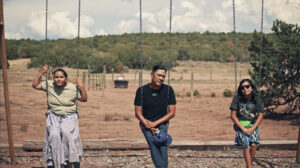OKMULGEE, Okla. – The opening voice over in “Frybread Face and Me” precisely sets more than just the tone for the coming-of-age feature film. Against a blank, black screen the narrator states, “My grandmother once told me in Navajo storytelling, symbols mean more than facts and time means nothing at all.” With this we get full on cultural context, setting, and the kind of kinship relations a good reservation tale has.
Filmmaker Billy Luther (Dine/Hopi/Laguna Pueblo) recently spoke about his film and career path with Mvskoke Media’s LiveWire.
The film follows Benny, an 11-year-old Navajo/Hopi/Pueblo city kid from San Diego, sent to spend the summer of 1990 with his maternal grandmother on the Navajo Reservation while his parents sort out their marriage. There, he experiences a fish-out-of-water summer with his culturally-grounded cousin Dawn, gets a crash course on being Navajo, and remains true to himself. When his disconnected uncle asks him the gibe, “Are you a cowboy or a cowgirl?” he answers with the already set understanding of who he is, “I’m just Benny,” he replies.
Benny remains Benny to the end, only changing in his awareness to the strength of his cultural ties when he effuses joy at the news it was his grandmother who made him first laugh. The moment references the A’wee Chi’deedloh (the baby laughed), a Dine ceremony celebrating a baby’s first laugh that occurs around 3 months of age. In the film, Benny makes his young cousin laugh for the first time while the family argues.
Premiering at the 2023 South by Southwest Film Festival in Austin, “Frybread Face and Me” was written
and directed by Luther. The film also retains Native and Indigenous involvement. It was produced by Chickasaw citizen Chad Burris’ company Indion Entertainment, and includes an executive producer credit from Luther’s long time friend Taika Waititi.

Homework, Preparation, and Networks
Luther knew early on what he wanted to do. That drive informed his career as a filmmaker. He said, “I loved telling stories. And when I probably was about 10 years old, I just knew exactly what I wanted to do. I wanted to work in television or film. I wanted to write and direct. So I would borrow cameras and VHS cameras and just with my neighborhood friends and just go out and start filming things. So it just started at an early age.”
After high school, Luther went to film school in Chicago. He began working in documentaries and has worked consistently in the genre for the last 15 years. His 2007 documentary “Miss Navajo” chronicled the experience of beauty pageant contestants in the Miss Navajo Nation contest. “Miss Navajo” premiered at Sundance Film Festival and aired on PBS’s “Independent Lens,” that year.
When Luther transitioned to narrative features he did research on programs that help upcoming screenwriters and directors. From there he got involved in Film Independent and the Sundance Screenwriters’ Lab. He explained the importance of workshopping ideas and developing thick skin.
He explained, “I had to do a lot of research and homework, which is not necessarily something that you’re taught about in college or in film school. You can’t just go out and write. I mean, you can, but you know, you have to kind of understand and know the industry and know that there are programs in all aspects of filmmaking. So I really did my homework and found a place that could workshop a film that I had, you know, wanted to write ‘Frybread’ and really became a part of their program.”
Rejection can be part of working through ideas. Luther advised those wanting to take on the task of filmmaking that rejection is just part of the process. He said, “It’s an extremely difficult career to take on. A lot of patience, a lot of rejections, a lot of no’s. But you have to have this thick skin, you can’t take things so personal. I had to go through several revisions of the film and to get into those Sundance and Film Independent labs with the script. So I had to rework and rewrite. And it’s not for the faint. It’s very, very, very hard.”
Currently available on Netflix, the movie has enjoyed success and has recently been on the platform’s list of top ten streaming programs in the U.S. Regarding this accomplishment Luther related, “I think Native social media played a great role in spreading the word, we basically had zero dollars in advertising, we’re such a small film. So getting to be in the top 10 was huge for us. And I think that was really rewarding, not just for me, but for everybody who put their heart and soul into the film.”




